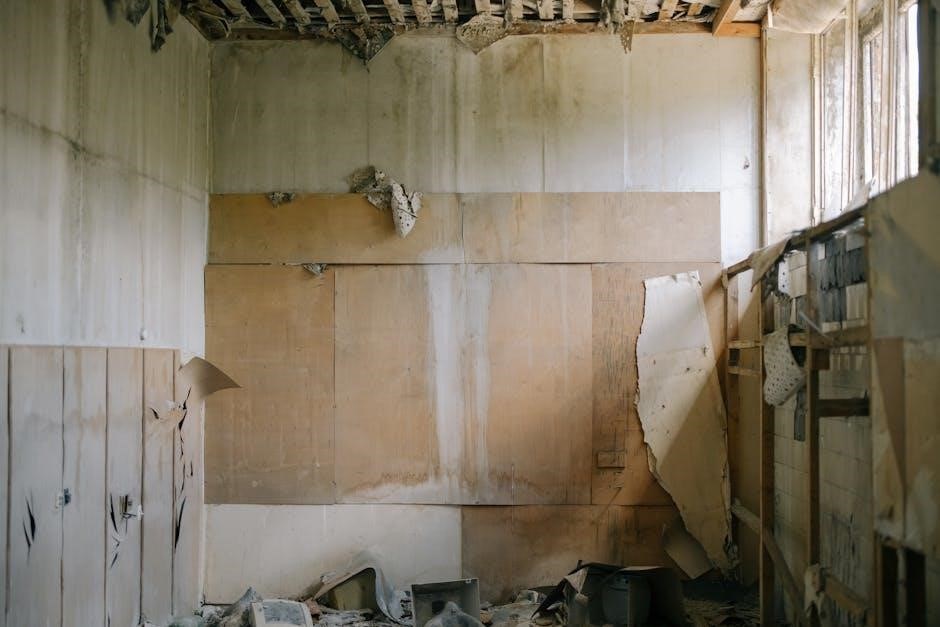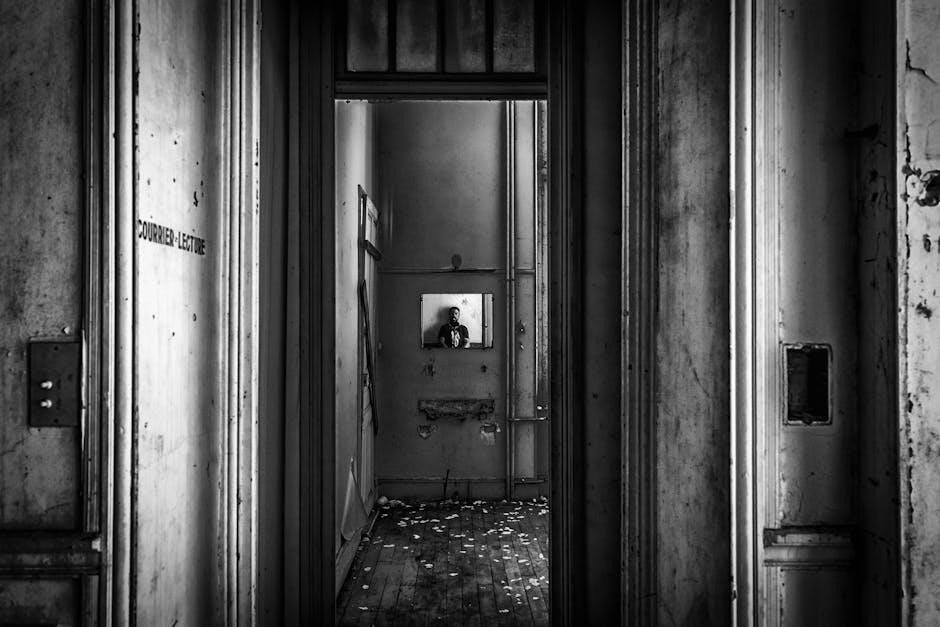Lynn Nottage’s Ruined is a Pulitzer Prize-winning play set during the Congolese Civil War, exploring themes of sexual violence and resilience. Its availability as a PDF enhances accessibility for global readers, making it a crucial read in understanding postcolonial trauma and human rights issues.
Overview of the Play
Ruined by Lynn Nottage is a powerful drama set during the Congolese Civil War, exploring the lives of women caught in the conflict. The play centers around Mama Nadi, who runs a brothel that serves as a refuge for women fleeing violence. Through their stories, Nottage examines themes of sexual violence, survival, and resilience. The brothel becomes a complex space where exploitation and humanity coexist. The play sheds light on the harrowing realities of war while emphasizing the strength and resourcefulness of women in the face of unimaginable adversity. Its unflinching portrayal makes it a significant work in contemporary theatre.
Historical Context of the Congolese Civil War
The Congolese Civil War, spanning from the late 1990s to the early 2000s, was a brutal conflict fueled by ethnic tensions, resource exploitation, and political instability. It involved multiple factions and foreign interventions, leading to widespread violence, displacement, and human rights abuses. The war devastated communities, with women and children bearing the brunt of sexual violence and forced labor. This backdrop of chaos and exploitation is vividly portrayed in Ruined, as Lynn Nottage highlights the resilience of women navigating the horrors of war while struggling to maintain their dignity and humanity in a shattered society.

Plot Summary
Ruined by Lynn Nottage is set in a brothel during the Congolese Civil War, where Mama Nadi shelters women from the conflict’s horrors. The play explores their struggles, resilience, and survival amidst war’s brutality, highlighting their emotional and physical scars while revealing their strength in the face of unimaginable hardship.
Setting: Mama Nadi’s Brothel
The play unfolds in Mama Nadi’s brothel, nestled in the Democratic Republic of Congo during the civil war. This makeshift sanctuary serves as a refuge for women escaping violence, offering a fragile sense of normalcy amidst chaos. The brothel, while a space of survival, is also a stark reminder of the war’s proximity and its impact on women’s lives. The setting vividly contrasts the brothel’s relative safety with the brutal conflict outside, highlighting the duality of survival and exploitation. The PDF version of the play captures the gritty realism of this setting, immersing readers in the world Nottage creates.
Key Characters and Their Roles
Mama Nadi, the protagonist, runs a brothel in the war-torn Congo, offering refuge to women while navigating moral ambiguities. Sophie, a young woman brutalized by soldiers, embodies resilience despite her physical and emotional scars. Salima, another survivor, grapples with her past and the loss of her child, symbolizing the devastating impact of war on women. Christian, a local trader, provides a connection to the outside world and complicates Mama Nadi’s pragmatic worldview. These characters, central to the play’s narrative, reveal the human cost of conflict and the ways individuals adapt to survive. The PDF version captures their depth and complexity vividly.
Themes and Messages
Ruined explores survival, resilience, and exploitation of women in war-torn Congo, highlighting their strength amidst unimaginable atrocities, and critiques societal failures that enable such violence.
Sexual Violence and Human Trafficking
Lynn Nottage’s Ruined vividly portrays sexual violence and human trafficking as tools of war in the Congolese Civil War. The play highlights the exploitation of women, forced into brothels and subjected to unimaginable atrocities. Mama Nadi’s brothel serves as a stark reminder of how women’s bodies become battlegrounds, their autonomy stripped away. The characters’ harrowing experiences expose the systemic violence and degradation inflicted upon them, while also revealing their resilience and resistance. Nottage’s unflinching portrayal sheds light on the long-lasting physical and emotional scars, emphasizing the need for justice and healing in post-conflict societies.
Resilience and Survival in Conflict Zones
Amidst the chaos of the Congolese Civil War, Ruined by Lynn Nottage underscores the resilience of women in conflict zones. Mama Nadi’s brothel becomes a complex sanctuary where women survive by navigating exploitation and violence. The characters exhibit remarkable strength, adapting to dire circumstances while maintaining fragments of their humanity. Through their stories, Nottage highlights the resourcefulness and solidarity that enable survival. Yet, this resilience is tempered by the deep scars of trauma, illustrating the cost of enduring war. The play serves as a testament to the human spirit’s capacity to persevere amidst unimaginable hardship and adversity.
Reception and Awards
Lynn Nottage’s Ruined won the Pulitzer Prize for Drama, earning critical acclaim for its powerful portrayal of women’s resilience. Its PDF availability enhances global accessibility to this vital narrative.
Pulitzer Prize for Drama
Ruined earned Lynn Nottage the Pulitzer Prize for Drama in 2009, recognizing its unflinching portrayal of women’s struggles during the Congolese Civil War. The play’s raw, emotional depth and its ability to shed light on human trafficking and sexual violence resonated deeply with critics and audiences alike. This prestigious award solidified Nottage’s reputation as a leading voice in contemporary theatre, highlighting the play’s significance in addressing global human rights issues. The PDF format of the play has made this important work more accessible, ensuring its message reaches a wider audience.
Other Accolades and Critical Acclaim
Beyond the Pulitzer, Ruined received the New York Drama Critics’ Circle Award for Best Play and a Drama Desk Award for Outstanding Play. Critics praised its vivid storytelling and unflinching honesty. The play’s PDF availability has further amplified its reach, making it a staple in academic and theatrical discussions. Its success at the Almeida Theatre’s European premiere and subsequent productions underscored its universal relevance, cementing its place as a modern classic in theatre history. The play’s ability to balance harrowing themes with moments of resilience has left a lasting impact on audiences globally.
PDF Availability and Accessibility
Ruined is widely available as a PDF, enhancing reader access. Its digital format allows easy sharing and storage, making the play accessible worldwide for study and reading.

Benefits of the PDF Format for Readers
The PDF format of Ruined offers numerous benefits, including easy accessibility and portability. Readers can download and store the file, enabling offline reading anywhere. The format preserves the play’s layout, ensuring a consistent reading experience. PDFs are also cost-effective and environmentally friendly compared to physical copies. Additionally, the file can be easily shared among readers, facilitating discussions and educational use. The ability to search and highlight text makes it ideal for academic purposes. Overall, the PDF version enhances accessibility and convenience for a global audience.
Downloading and Sharing the File
Downloading Ruined as a PDF is straightforward, with various online platforms offering free access; The file size is typically small, ensuring quick downloads even with limited internet speed. Once downloaded, the PDF can be shared easily via email or cloud storage, making it accessible to multiple readers. Sharing fosters discussions and educational use, particularly in academic settings. However, it’s important to respect copyright laws and ensure sharing is for personal or educational purposes only. This accessibility promotes the play’s reach and impact globally, aligning with its themes of resilience and awareness.

Cultural and Academic Significance
Lynn Nottage’s Ruined significantly impacts postcolonial trauma discussions, features in academic curricula for gender and conflict studies, and is a key text in cultural studies globally.
Impact on Postcolonial Trauma Discussions
Ruined by Lynn Nottage has profoundly influenced postcolonial trauma discussions by depicting the Congolese Civil War’s impact on women, emphasizing sexual violence and survival. The play’s unflinching portrayal of human rights abuses resonates globally, sparking conversations about gender, power, and resilience in conflict zones. Its availability as a PDF enhances accessibility, allowing scholars and readers worldwide to engage with its powerful narrative. Nottage’s work bridges theater and academia, making it a cornerstone in discussions about trauma, recovery, and justice in postcolonial contexts, while highlighting the enduring scars of war on individuals and communities.
Use in Educational Curricula
Ruined is widely incorporated into educational curricula for its exploration of conflict, gender, and resilience. The PDF format facilitates easy distribution among students, enabling classroom discussions on postcolonial trauma and human rights. Educators use the play to teach critical thinking about historical contexts and social issues. Its inclusion in syllabi highlights its relevance to interdisciplinary studies, such as drama, sociology, and women’s studies. The play’s accessibility as a digital resource ensures its impact extends beyond theater, making it a vital tool for fostering empathy and understanding among students and scholars alike.

Production and Performances
Ruined premiered in Europe at the Almeida Theatre in London, opening on April 22, 2010, and ran until June 5, 2010, with a notable cast.
European Premiere at the Almeida Theatre
Ruined made its European debut at London’s Almeida Theatre, opening on April 22, 2010, following previews from April 15. This production marked a significant milestone, introducing Nottage’s powerful narrative to European audiences. The play ran until June 5, 2010, and was praised for its unflinching portrayal of conflict and resilience. The Almeida Theatre’s staging highlighted the play’s universal themes, drawing critical acclaim and further solidifying its reputation as a vital work of contemporary theatre. The success of this premiere underscored the play’s ability to resonate globally, making it a landmark production in its European journey.
Notable Stage Adaptations and Casts
Ruined has seen several notable stage adaptations, with its European premiere at the Almeida Theatre in 2010 being a landmark production. The cast featured talented actors who brought depth to the complex characters, earning critical acclaim. Other stagings, such as the original Broadway production, showcased powerful performances that highlighted the play’s emotional intensity. These adaptations have consistently demonstrated the play’s ability to resonate with diverse audiences, solidifying its place in contemporary theatre. The casts’ portrayals of resilience and trauma have been particularly praised, further enhancing the play’s impact and relevance.
Ruined remains a powerful exploration of war’s impact on women, with its PDF availability ensuring accessibility for educational and cultural discussions, cementing its legacy in modern theatre.
Legacy of “Ruined” in Modern Theatre
Ruined has left an indelible mark on contemporary theatre, earning the Pulitzer Prize and acclaim for its unflinching portrayal of war’s impact on women. Its exploration of postcolonial trauma and gender-based violence resonates globally, influencing discussions on human rights. The play’s availability in PDF format has enhanced its accessibility, making it a vital resource for academic and cultural studies. Performances at prestigious venues like the Almeida Theatre have further solidified its reputation, ensuring its continued relevance in addressing systemic injustices and fostering empathy through storytelling.
Final Thoughts on the Play’s Relevance
Ruined remains a powerful commentary on gender violence, resilience, and human rights, offering a searing look at war’s impact on women. Its relevance endures as a global call for justice, with its PDF availability democratizing access to this vital narrative. The play’s unflinching honesty continues to spark essential conversations, ensuring its place in both academic curricula and cultural discourse. By addressing universal themes, Ruined fosters empathy and understanding, solidifying its importance in contemporary theatre and beyond.
